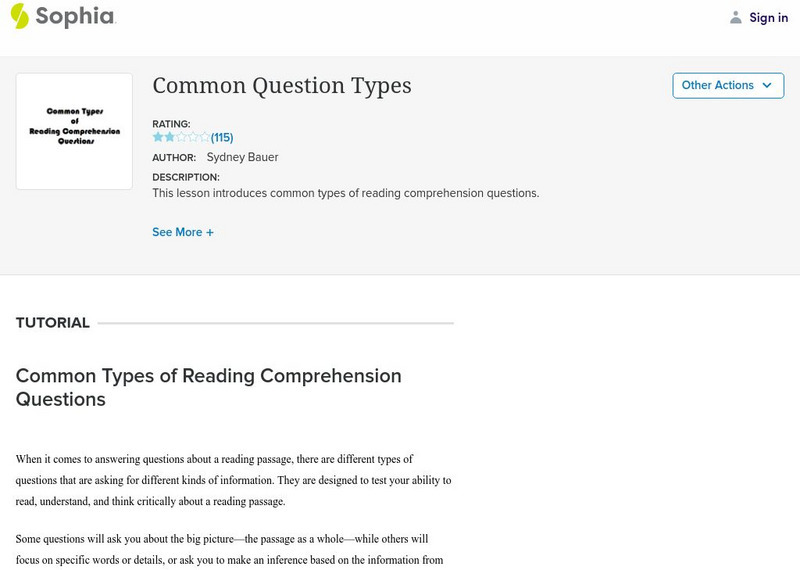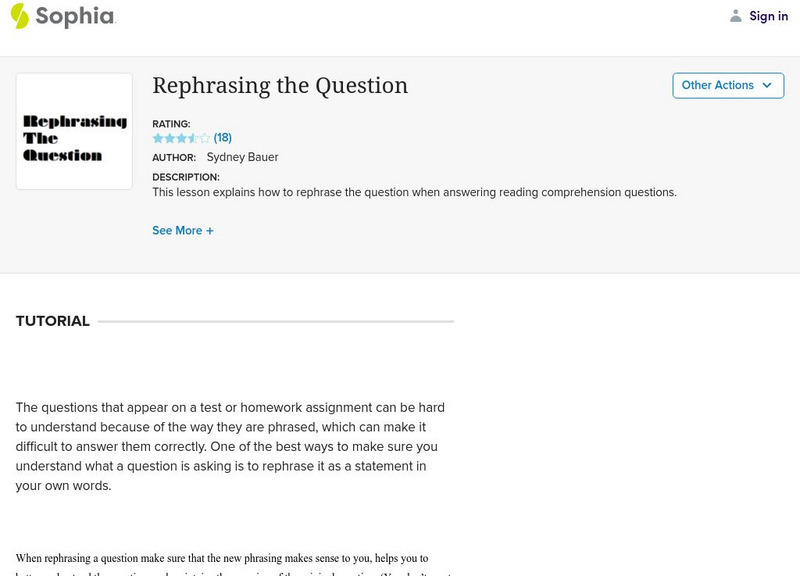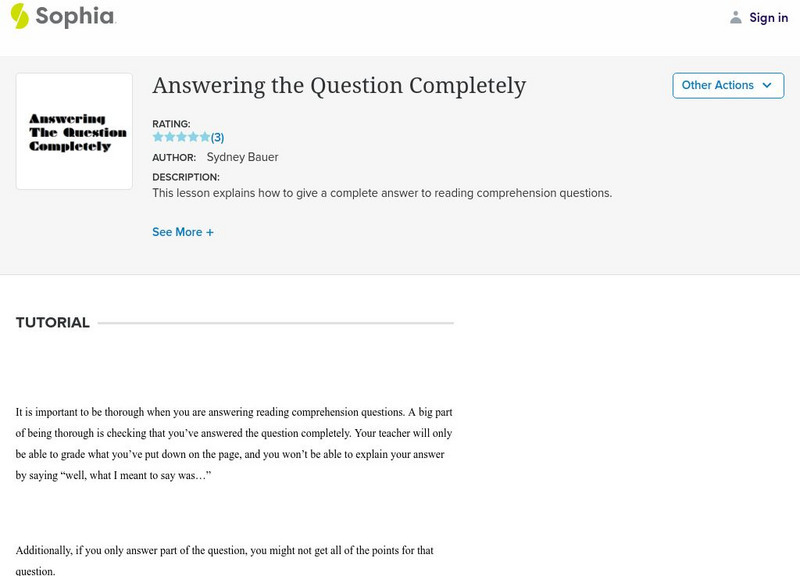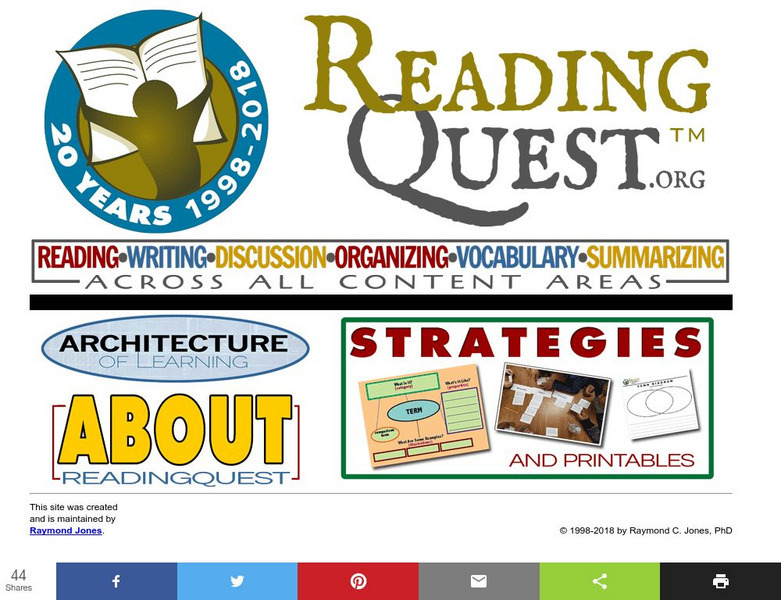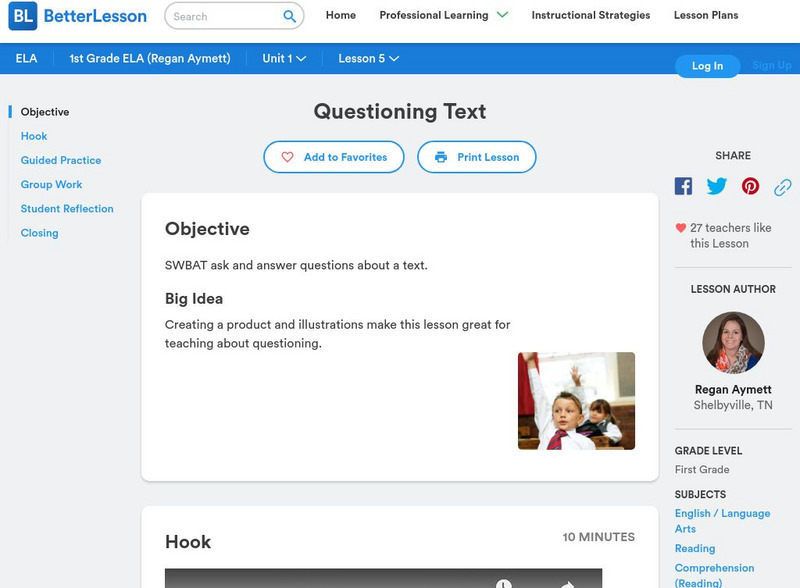ReadWriteThink
Read Write Think: Qa Rs + Tables = Successful Comprehension of Math Word Problems
Contains plans for two lessons that explain how to use the question-answer relationship (QAR) strategy to make word problems easier to understand. In addition to objectives and standards, these instructional plans contain links to sites...
ReadWriteThink
Read Write Think: Qa Rs to Develop Comprehension & Reflective Reading Habits
Contains plans for three lessons that use the QAR strategy to develop reading comprehension and reflective reading within students. In addition to objectives and standards, this instructional plan contains links to sites used in the...
Sophia Learning
Sophia: Common Question Types
This lesson focuses on the six main types of reading comprehension questions: main idea, purpose, tone, inference, detail, and definition. It explains each type and offers examples in text and in audio formats.
Sophia Learning
Sophia: Rephrasing the Question
This lesson explains how to rephrase reading questions into statements to improve understanding of what is being asked and provides examples. This information is offered in text and audio formats.
Sophia Learning
Sophia: Answering the Question Completely
This lesson explains the importance of answering questions completely and how to do so; it provides this information in both text and audio formats.
Sophia Learning
Sophia: Avoiding Digressions
This lesson focuses on avoiding digressions when answering questions; it defines digressions, discusses the reasons to avoid them, and explains how to avoid them in both text and audio formats.
Other
Reading Quest: Making Sense of Social Studies
Teaching students to read well in areas other than language arts requires teaching and reinforcing the kinds of reading strategies taught here. There are 27 strategies, ranging from brainstorming to word mapping. The site includes PDF...
Michigan State University
Michigan State University: Interventions for Reading Strategies: Qar Strategy
This Michigan State University site suggests three question-answer relationships strategies, rather than four, leaving out "author and you." Includes examples of each relationship, steps for teaching, and assessment.
Other
Reading Educator: Question Answer Relationships
Based on the presumption that every teacher shares responsibility for teaching reading, this page offers a brief look at question-answer relationships, as well as suggestions for putting the strategy to use in the classroom.
ReadWriteThink
Read Write Think: Student Led Book Clubs Using Qar
Contains plans for lessons that use the Question-Answer Relationships (QAR) strategy in book discussion groups. In addition to objectives and standards, this instructional plan contains links to sites used in the lessons as well as...
ReadWriteThink
Read Write Think: Applying Question?answer Relationships to Pictures
Contains plans for two lessons that develop students' ability to ask questions about the pictures in a text. In addition to objectives and standards, this instructional plan contains links to sites used in the lessons as well as...
Sophia Learning
Sophia: Planning Your Answer
In this slide show tutorial, students will review how to approach answering short answer and extended response essay questions. Marking strategies examples are included.
Sophia Learning
Sophia: Planning Your Answer
In this slide show tutorial, students will review how to approach answering short answer and extended response essay questions. Marking strategies examples are included.
Better Lesson
Better Lesson: Go Away Shadow!
Shadows are all around us. During this lesson, with teacher guidance, students will answer text dependent questions and draw conclusions about the book Bear Shadow.
Better Lesson
Better Lesson: Questioning Text
Creating a product and illustrations make this lesson great for teaching about questioning. Students will ask and answer questions about a text via the assistance of a graphic organizer.
AdLit
Ad lit.org: Classroom Strategies: Question Answer Relationship (Qar)
Question-Answer relationship (QAR) is a strategy to be used after students have read. QAR teaches students how to decipher what types of questions they are being asked and where to find the answers to them. Four types of questions are...
Other
Iseesam: Comprehension Questions
This PDF explains what students are asked to do when answering Literal, Inference, and Evaluative comprehension questions.
Other
Reading Comprehension: Question Answer Relationships
If you need help working with your students on questioning a text or if you are working on higher-level questioning skills, this is a simple and helpful site. Printable resources available from site.




